HANGED, TOGETHER
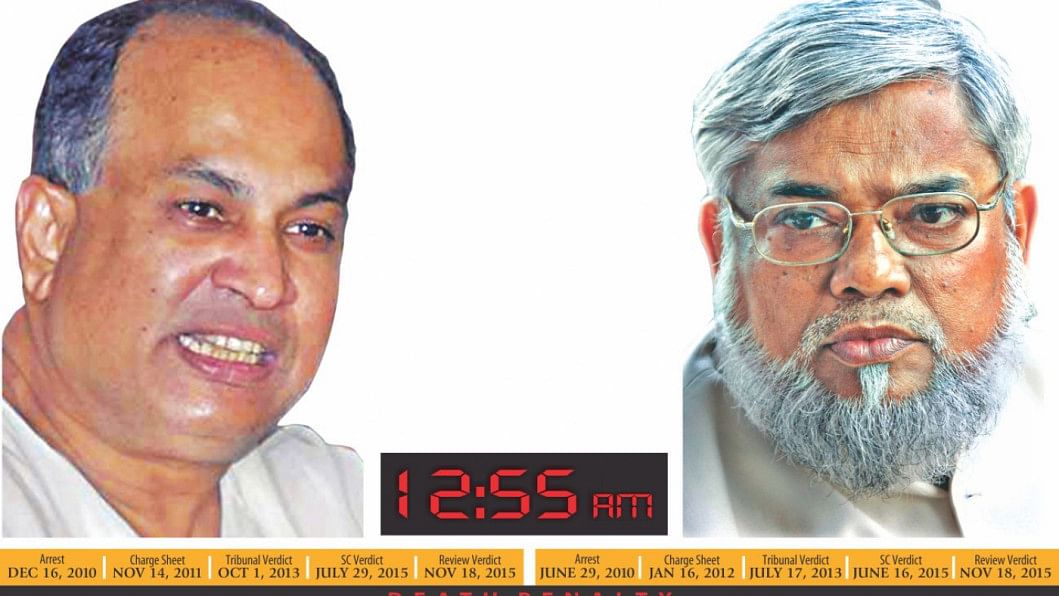
These two had earned special places in the ruthless killing fields of 1971 Bangladesh. Then, after the liberation, they went on to become ministers of the very country they had stabbed and made to bleed. Theirs were the pitiless, feared faces of genocide in 1971.
In a free Bangladesh, they became the face of insolence and mockery in politics. Forty-four years after their brutal crimes against humanity, justice finally caught up with them with their hangings early hours today.
They not only opposed the notion of Bangladesh but brutally killed those who loved freedom, who could think with an open mind and who dared to take up arms to fight the Pakistan army that had plunged the people and the country in a nine-month bloody war.
One of them, Ali Ahsan Mohammad Mojaheed, raised the most fearsome gang Al-Badr to exterminate the intelligentsia of the country.
The other, Salauddin Quader Chowdhury, was a terrifying young goon in Chittagong who led his gang along with the Pakistani forces into Hindu populated villages and killed at will because he thought the Hindus did not vote for his father and that Hindus were enemies of Pakistan.
Bangladesh won its freedom, but these people, after a brief respite of three and a half years, got back their might and the ladder to power following the killing of Bangabandhu Sheikh Mujibur Rahman in 1975.
Salauddin, who openly mocked the Liberation War and its martyrs and gloated over his role as a Razakar, also became adviser of parliamentary affairs of Khaleda Zia in her 2001-06 government.
Mojaheed made a most audacious comment in 2007 that there were no war criminals in the country, drawing widespread criticism.
With the hangings of these two convicted war criminals at the Dhaka Central Jail at 12:55am today, Bangladesh once again proved that it would not forgive these unrepentant murderers, that they have no place in a country whose birth they opposed and that justice shall prevail.
With their executions, the country once again paid back a little bit of the immeasurable debt it owe the three million martyrs and the millions more who went through a harrowing time to snatch victory.
Mojaheed, 67, is the third Jamaat leader to have died for war crimes, after Abdul Quader Mollah in December 2013 and Muhammad Kamaruzzaman in April this year.
Salauddin, 66, is the first BNP leader to have walked the gallows for war atrocities.
This is for the first time in the country that two ministers have been hanged for war crimes.
There was no immediate reaction from the BNP, but Jamaat called a countrywide daylong hartal for tomorrow, protesting the hanging of Mojaheed.
"They [Mojaheed and Salauddin] walked the gallows around 12:55am about the same time," Brig Gen Syed Iftekhar Uddin, inspector general (prisons), told The Daily Star by phone minutes after the hanging.
Four ambulances, two of them carrying the bodies of Mojaheed and Salauddin, came out of the Dhaka Central Jail under police protection around 2:50am and headed for their village homes in Faridpur and Chittagong.
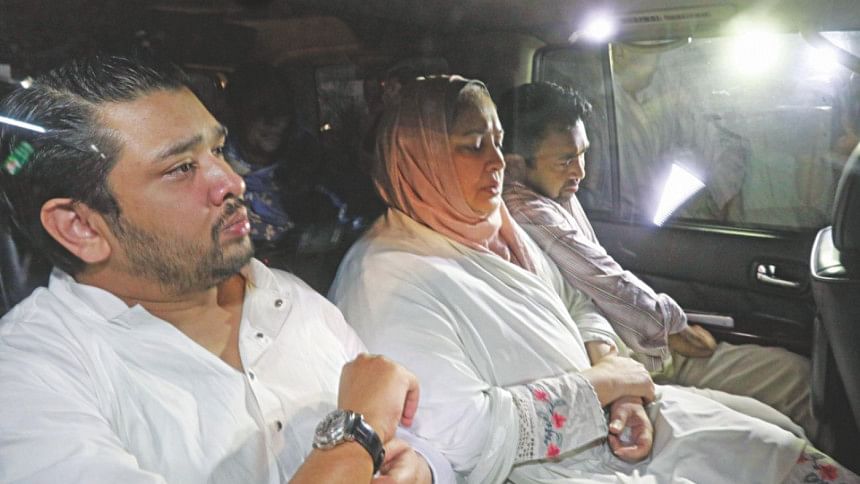
Mojaheed will be buried at Ideal Cadet Madrasa premises at Pashchim Kabashpur area of Faridpur, said Nazim Uddin, officer-in-charge of Faridpur Sadar Police Station.
Salauddin will be buried at his family graveyard at Gohira in Raozan, said Pradip Kumar Das, officer-in-charge of Raozan Police Station.
As the news of their executions reached the Shahbagh intersection, Gonojagoron Mancha activists, who were there since yesterday morning, erupted into joyful cheers.
The executions came three days after the Supreme Court rejected their petitions for reviewing the death sentences on Wednesday, bringing an end to a five-year-long legal battle.
In her instant reaction, Shyamoli Nasrin Alim Chaudhury, the widow of martyred intellectual Alim Chaudhury, said, "The agonising wait for 44 years has finally come to an end. We were deprived of justice. Finally we got that with their executions."
She said Mojaheed was the kingpin of Al-Badr responsible for killing the intellectuals. "As a member of the martyred intellectual family, I am very happy to see the first-ever execution of a murderer of intellectuals."
Prafulla Kumar Sinha, whose father Nutan Chandra Sinha was killed by Salauddin and Pakistan army, said, "My father's soul will now find peace. We are relieved of the agonising pain we have been in for the last 44 years."
He expressed his gratitude to the prime minister and people, including lawyers and investigators involved in the trial process.
FACES OF THE RUTHLESS TRAITORS
Mojaheed was the president of Islami Chhatra Sangha, the then Jamaat-e-Islami's student wing, and towards the last part of 1971 and became the chief of infamous Al-Badr Bahini.
During the war, he visited many districts and held meetings with his followers and instigated them to annihilate freedom fighters as well as pro-liberation people, according to court documents.
And only days before the liberation, Al-Badr men, under his leadership, traced houses, systematically rounded up, tortured and brutally killed the brightest of the luminaries -- professors, litterateurs, journalists and doctors -- to cripple the country intellectually once and for all.
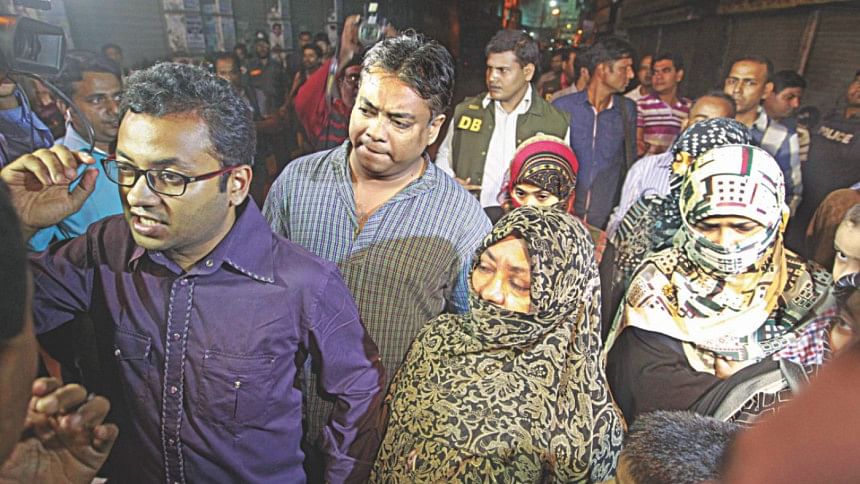
After independence, Mojaheed went into hiding and resurfaced after the political changeover in the country with the assassination of Bangabandhu. In time, his political clout would grow, and would become minister.
Salauddin, a self-proclaimed brigadier of Chittagong in 1971, was not involved in politics in 1971, but he actively took part in the election campaign of his father Fazlul Quader Chowdhury, the then president of anti-liberation Convention Muslim League in 1970.
During the war, Salauddin, along with his men and Pakistani occupation forces, unleashed a cold-blooded savagery on five Raozan villages in Chittagong, killing 111 Hindu men. His father and he blamed the Hindu men for his father's defeat in 1970.
Salauddin did not even spare Natun Chandra Sinha, a social worker and philanthropist. He and his men killed Natun, dragging him out of a temple where he was praying at the time. He also accompanied the Pakistan army men when the abducted Awami League leader Mozaffar Ahmed and his son, who were later found dead.
Turing their Goods Hill house as a torture centre, Salauddin and his men tortured freedom fighters and pro-liberation people during the war.
Towards the end of the war, he first fled to Pakistan and from there went to London. He returned to Bangladesh in 1974 and joined politics after 1975 political changeover and became lawmakers several times. He became a minister during the Ershad regime.
HANGED, FINALLY
The countdown of their execution began after the Supreme Court dismissed their review petitions. Members of both the families met them at Dhaka Central Jail the following day.
On Friday, when the jail authorities asked Mojaheed and Salauddin if they would seek presidential clemency, they took time to give their decisions. Lawyers of both the convicts filed petitions to meet them but the jail authorities did not allow them.
Since yesterday morning, there had been indications that the two would be executed by last night.
Security was tight throughout the day around the Dhaka Central Jail where the two convicts were kept, and it was further beefed up in the evening when additional police and Rab and members were deployed.
All shops and establishments around the jail area were ordered to shut down by 8:00pm and onlookers were asked to clear the area. The road leading to the prison from Chawkbazar was closed around 7:40pm. Only journalists were allowed to pass through the area to go near the jail gate, that too after verifying their ID cards.
The convicts sought presidential clemency yesterday, which was turned down by President Abdul Hamid, said Home Minister Asaduzzaman Khan Kamal.
Around 8:00pm, the jail authorities called family members of the two to meet the Salauddin and Mojaheed. The family members went to the Dhaka Central Jail around 9:00pm.
Finally, they were hanged at 12:55am.
[Shaheen Mollah and Rafiul Islam contributed to this report.]

 For all latest news, follow The Daily Star's Google News channel.
For all latest news, follow The Daily Star's Google News channel. 

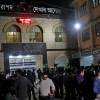
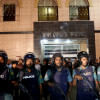


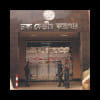
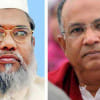


Comments